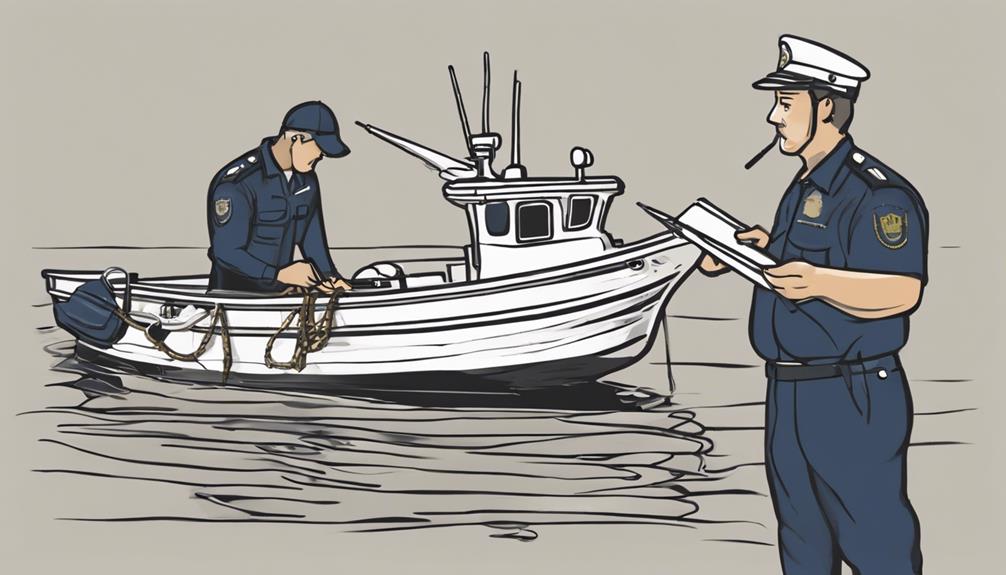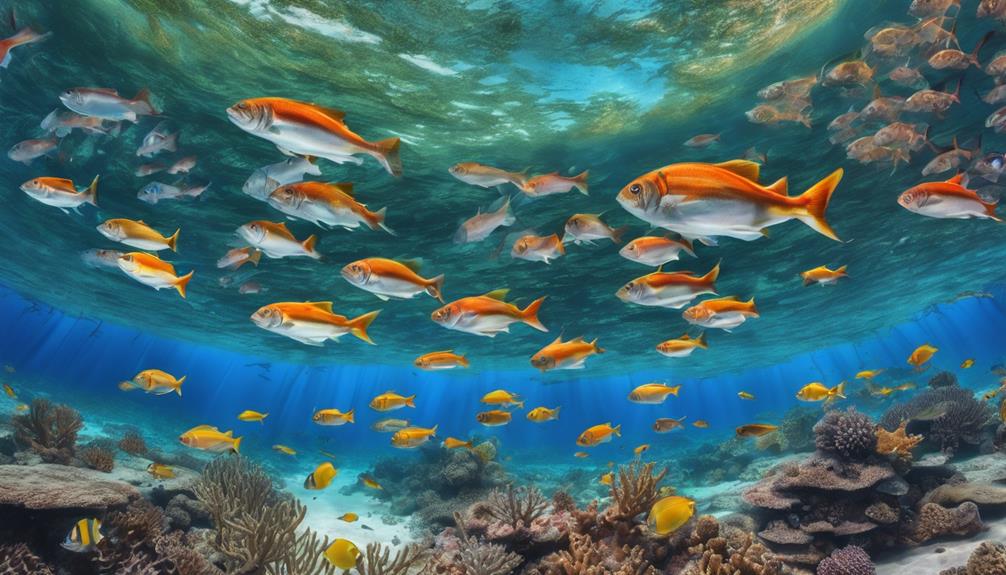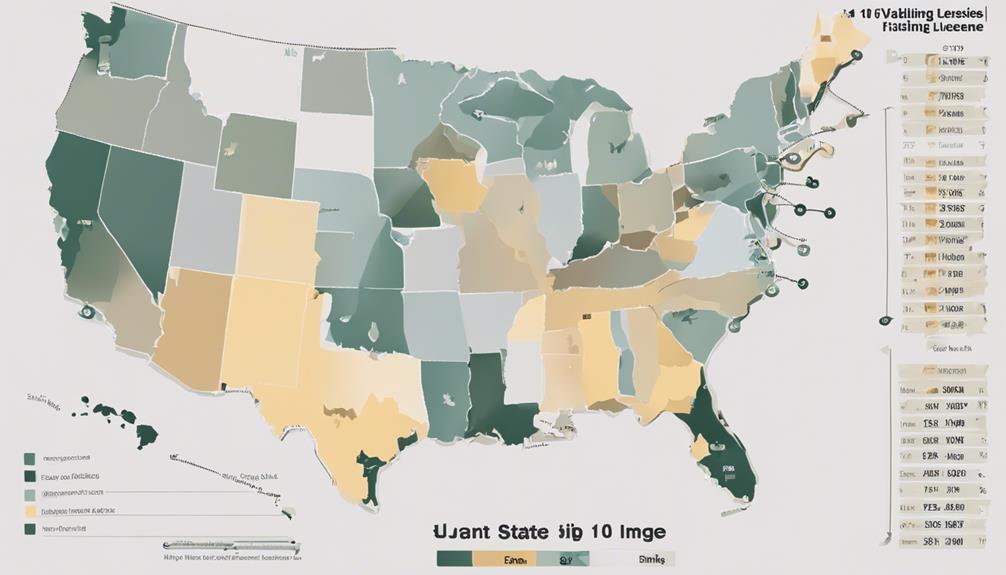Have you ever wondered why Florida marine fishing regulations play a crucial role in preserving the state's aquatic ecosystems?
The regulations set in place are not just arbitrary rules but serve a vital purpose in safeguarding the delicate balance of marine life. By adhering to these regulations, you contribute to the sustainability of fish populations, protect endangered species, and maintain the health of Florida's waters.
But that's just the beginning of why these regulations are essential.
Importance of Florida Marine Fishing Regulations
Understanding the importance of Florida's marine fishing regulations is essential for sustainable fishing practices and the preservation of marine ecosystems. As an angler, engaging in responsible angling not only ensures the health of fish populations but also contributes to overall environmental stewardship. By following these regulations, you play a crucial role in maintaining the delicate balance of marine ecosystems and safeguarding them for future generations.
Responsible angling involves adhering to catch limits, size restrictions, and seasonal closures set by Florida's marine fishing regulations. These rules are designed to prevent overfishing, protect vulnerable species, and promote biodiversity within the marine environment. By respecting these guidelines, you actively participate in the conservation efforts that are necessary to sustain healthy fish stocks and marine habitats.
Environmental stewardship is at the core of Florida's marine fishing regulations, aiming to strike a harmonious balance between human activity and the marine environment. By practicing responsible angling in compliance with these regulations, you demonstrate a commitment to preserving the natural beauty and biodiversity of Florida's waters. Your actions as an angler have a direct impact on the health of marine ecosystems, making it imperative to prioritize conservation and sustainability while enjoying the thrill of fishing in Florida's abundant waters.
Conservation of Marine Resources
Conserving marine resources is vital for maintaining the health and sustainability of Florida's marine ecosystems. By implementing and adhering to fishing regulations, you play a crucial role in protecting marine biodiversity and promoting ecosystem health.
Here's why conservation of marine resources is essential:
- Preservation of Marine Biodiversity: Fishing regulations help prevent overfishing of certain species, allowing populations to thrive and maintain a healthy balance within the ecosystem. Protecting a diverse range of marine species ensures the stability and resilience of the entire ecosystem.
- Maintaining Ecosystem Health: Healthy marine ecosystems depend on the intricate relationships between different species. By conserving marine resources, you contribute to the overall well-being of the ecosystem. This, in turn, supports essential ecosystem services such as nutrient cycling, habitat provision, and climate regulation.
- Safeguarding Future Generations: Responsible management of marine resources today ensures that future generations can also enjoy and benefit from these valuable natural assets. Conserving marine resources now helps sustain the abundance and diversity of marine life for the long term, ensuring a legacy of thriving ecosystems for years to come.
Sustainable Fishing Practices
Implementing sustainable fishing practices is crucial for preserving marine ecosystems and ensuring the long-term viability of fish populations. By adopting responsible harvesting techniques and promoting fishing sustainability, we can help maintain the delicate balance within marine ecosystems. Sustainable fishing practices involve strategies that allow fish populations to replenish naturally without being overexploited.
Responsible harvesting is essential to prevent the depletion of fish stocks and protect the overall health of the marine ecosystem. By avoiding overfishing and minimizing bycatch, we can safeguard the biodiversity of marine habitats and support the resilience of fish populations. Additionally, implementing regulations that limit fishing activities during sensitive breeding seasons can help maintain healthy population levels.
Fishing sustainability requires a collaborative effort from fishermen, regulatory agencies, and conservation organizations to ensure that fishing practices are environmentally friendly and economically viable in the long run. By adhering to guidelines that promote sustainable fishing, we can protect the future of marine resources and support the livelihoods of coastal communities that depend on fishing.
Protection of Endangered Species
Preserving the delicate balance of marine ecosystems relies heavily on the protection of endangered species. By safeguarding these vulnerable marine creatures, we not only ensure their survival but also contribute to the overall health of the ocean environment.
Here's why endangered species protection and habitat preservation are crucial:
- Maintaining Biodiversity: Endangered species play unique and vital roles in the ecosystem. Their disappearance can disrupt the food chain, leading to imbalances that affect other species. By protecting these endangered species, we help maintain biodiversity and the stability of marine ecosystems.
- Preserving Habitats: Endangered species often serve as indicators of environmental health. Protecting their habitats not only safeguards them but also helps preserve essential marine ecosystems. Habitats such as coral reefs, mangroves, and seagrass beds provide crucial breeding and feeding grounds for a variety of marine species, making habitat preservation vital for the overall ecosystem.
- Supporting Ecotourism: Many endangered species are charismatic megafauna that attract tourists. By conserving these species and their habitats, we support sustainable ecotourism practices. This not only benefits local economies but also raises awareness about the importance of protecting marine environments for future generations.
Preventing Overfishing in Florida Waters
To ensure the sustainability of marine life in Florida waters, it's crucial to address the issue of overfishing through effective management strategies. Sustainable management practices are essential to maintain the delicate balance of Florida's marine ecosystem. Overfishing occurs when more fish are caught than the population can replenish, leading to a decline in fish stocks and disrupting the ecosystem's health.
Effective measures such as catch limits, size restrictions, and marine protected areas help prevent overfishing and promote sustainable fishing practices. By implementing these regulations, Florida can safeguard fish populations, preserve biodiversity, and support the overall health of the marine environment. Sustainable management not only benefits the fish populations but also ensures the long-term viability of the fishing industry for future generations.
Overfishing not only depletes fish stocks but also has cascading effects on the entire ecosystem. When certain fish populations decline, it can disrupt the food chain, affecting other marine species and overall ecosystem health. By managing fishing activities responsibly, Florida can protect the delicate balance of its marine environment and support the livelihoods of those who depend on it.
Ensuring Fairness in Fishing Activities
Ensuring fairness in fishing activities starts with establishing transparent and equitable regulations. To maintain fair competition and promote ethical fishing practices, it's crucial to have guidelines that govern how fishing activities are conducted. Here's how Florida's marine fishing regulations help in achieving this:
- Equal Opportunities: Regulations ensure that all anglers have equal opportunities to access fishing grounds and resources. By setting limits on catch sizes and fishing seasons, every angler gets a fair chance to enjoy the bounty of Florida's waters without any individual or group depleting the resources unfairly.
- Accountability: Fairness is also upheld through accountability measures such as licensing requirements and catch reporting. By monitoring and enforcing these rules, authorities can prevent any unfair advantages gained through illegal or unethical fishing practices, ensuring that all participants play by the same rules.
- Conservation of Resources: Ethical fishing practices are essential for preserving marine ecosystems and maintaining sustainable fish populations. Regulations that promote catch-and-release practices for certain species, as well as guidelines on gear and methods, help protect the environment and ensure that future generations can continue to enjoy fishing in Florida's waters.
Compliance and Enforcement Measures

Maintaining compliance with fishing regulations is essential for safeguarding marine resources and promoting ethical fishing practices in Florida. To ensure adherence to these regulations, monitoring compliance is a crucial aspect. The Florida Fish and Wildlife Conservation Commission (FWC) employs various enforcement measures to prevent poaching and illegal fishing activities.
FWC officers conduct regular patrols in Florida's waters to monitor fishing activities. These officers have the authority to board vessels for inspections, check fishing licenses, and ensure that all catches comply with size and bag limits. By actively patrolling the waters, FWC can deter potential violators and swiftly address any instances of non-compliance.
In addition to on-water patrols, FWC also utilizes surveillance technology to monitor fishing activities. This includes the use of cameras, drones, and other monitoring devices to track fishing vessels and detect any suspicious behavior. By combining traditional enforcement methods with modern technology, FWC can effectively detect and deter illegal fishing practices.
Furthermore, FWC collaborates with other agencies and organizations to strengthen enforcement efforts. By sharing information and resources, these partnerships enhance the overall monitoring and enforcement capabilities, making it harder for individuals to engage in poaching or other illegal activities.
Benefits of Adhering to Regulations
Adhering to marine fishing regulations in Florida not only protects the fragile marine ecosystem but also ensures sustainable fishing practices for future generations. By following these regulations, you contribute to the preservation of marine life and the overall health of the oceans. Here are some key benefits of adhering to these regulations:
- Environmental Impact: Compliance with fishing regulations helps maintain biodiversity by preventing overfishing of certain species. By controlling catch limits and implementing size restrictions, you assist in preserving the delicate balance of the marine ecosystem. This, in turn, protects habitats and allows fish populations to thrive.
- Economic Benefits: Sustainable fishing practices supported by regulations lead to long-term economic advantages. By preventing depletion of fish stocks, regulations help sustain the fishing industry, supporting jobs and livelihoods for fishermen and related businesses. Additionally, a healthy marine environment attracts tourists and recreational anglers, boosting local economies through activities like charter fishing trips and seafood tourism.
- Resource Sustainability: Adhering to regulations ensures that fish populations have the opportunity to replenish and reproduce, securing the availability of seafood for present and future generations. Sustainable fishing practices maintain a balance between consumption and conservation, safeguarding the availability of fish as a food source and preserving the tradition of fishing for years to come.
Frequently Asked Questions
What Are the Penalties for Violating Florida Marine Fishing Regulations?
Violating Florida marine fishing regulations can lead to serious legal consequences. Enforcement agencies can issue fines to deter individuals from breaking the rules.
These penalties are in place to protect the marine environment and ensure sustainable fishing practices. Make sure to always follow the regulations to avoid facing fines and legal actions that can harm both the ecosystem and your wallet.
How Do Florida Marine Fishing Regulations Impact Commercial Fishing Operations?
When it comes to commercial fishing operations in Florida, regulations play a crucial role. They ensure sustainability by managing fish populations and protecting the ecosystem.
These rules impact economic aspects by balancing supply and demand, preventing overfishing, and promoting long-term profitability.
Are There Any Specific Regulations in Place for Recreational Fishing in Florida?
When you go fishing in Florida, remember that there are specific rules in place for recreational anglers. Make sure you have the necessary fishing license.
Pay attention to size limits for different species. Be mindful of bag limits to protect fish populations.
Keep track of season closures to help conserve marine resources. Following these regulations ensures sustainable fishing practices and helps preserve Florida's diverse marine ecosystem.
How Do Florida Marine Fishing Regulations Differ From Regulations in Other States?
Florida's marine fishing regulations differ from other states in terms of species-specific restrictions and size limits. Enforcement methods such as regular patrols and spot checks help ensure compliance with these rules.
Understanding these differences can help you navigate the fishing regulations effectively when fishing in Florida compared to other states. Make sure to familiarize yourself with the specific regulations of each state you plan to fish in to avoid any penalties.
What Role Do Local Communities Play in Enforcing and Promoting Adherence to Florida Marine Fishing Regulations?
Local communities play a crucial role in enforcing and promoting adherence to Florida marine fishing regulations. Community engagement is key to ensuring that rules are followed.
By working together and supporting enforcement strategies, such as educating residents, monitoring fishing activities, and reporting violations, communities help protect marine resources.
Their involvement strengthens conservation efforts and contributes to sustainable fishing practices in Florida waters.
Conclusion
In conclusion, following Florida marine fishing regulations is crucial for the conservation of marine resources. This includes promoting sustainable fishing practices, protecting endangered species, preventing overfishing, ensuring fairness in fishing activities, and maintaining compliance and enforcement measures.
By adhering to these regulations, you aren't only contributing to the preservation of Florida's aquatic ecosystems but also supporting the long-term viability of the fishing industry.
So, always remember to fish responsibly and follow the rules to help protect our marine environment.



